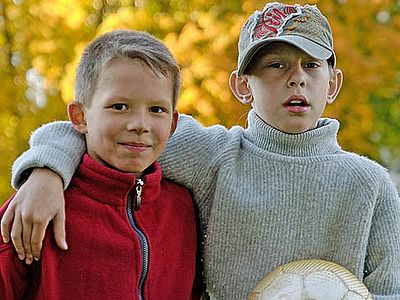Source: Truth and Charity Forum

Psychological studies and sociological surveys confirm what common sense naturally knows: children suffer untold emotional harm from divorce, and one consequence affects the education and the life of the mind. The school year does not have to proceed too far before teachers soon recognize the symptoms of divorce that reflect children’s performance in the classroom. Without any first-hand knowledge or being privy to personal information, teachers soon notice certain telltale signs that alert them to the problem. While these behaviors, of course, may affect other students and children from stable homes and other environments, they especially identify the children of divorce. Because the natural orders of home and family have collapsed, the order of the child’s soul also suffers. Without the order of the soul, the emotional life of a child undergoes a stress and strain that express themselves in attitudes and conduct that resist the discipline imposed by the rigors of serious learning.
First, children find it hard to concentrate on academic work with attention and diligence because they experience a deep conflict that gives them a sense of insecurity and instability. Without peace, harmony, and order in the home, students struggle to give priority or importance to studies. The anger, fears, and anxieties of the parents are visited upon the children. Just as sickness limits a student’s academic achievement, so mental turmoil also imposes a heavy burden that deprives children of the proper state of mind vital for learning. The mind requires composure and serenity to think, reflect, memorize, and master the subject matter of study. A recollected mind in an atmosphere of quiet and relaxation creates the right environment for study. As G. K. Chesterton observed, fifty percent of education is “atmosphere.”
Second, education requires a sense of wonder, the joy of learning, and a love of life. Divorce impoverishes children’s sources of happiness and delight and imposes upon them an oppressive weight of sadness. Divorce profoundly affects the spirit of the child and empties it of enthusiasm, excitement, and energy. The teacher soon notices a passivity, listlessness, and apathy in these students who tend to do the minimum, show no intense determination to learn, and show no lively interest in any of the subjects of the curriculum. Because a home and an intact family exert a loving influence upon the child, they possess the power to motivate, exhort, and inspire him to do his best. While it is only natural for children to desire to please the ones they love, divorce deprives the child of a great source of happiness and thus reduces his desire to please and do his best. The joy of a home naturally awakens a love of the true, the good, and the beautiful that education at its best cultivates.
Third, the child of divorce appears disoriented and disorganized. Homework often goes unfinished, essays do not meet deadlines, missing work is not completed, and punctuality is not observed. Tardiness and procrastination appear in multiple forms. As Socrates and Plato teach, if there is no order in the soul, a person’s life also will lack self-control and self-discipline. Because the child often lives in two homes or two blended families and adjusts to two different sets of customs and standards, he fails to gain a clear sense of expectation that two parents with the same ideals and teachings more easily instill in the young. This state of mind breeds a sense of sloth or apathy with an attitude of “Who Cares?” Nothing ultimately matters. Whether he succeeds or fails carries no importance because he does not matter to one of his parents who is absent from his life. In short, the child of divorce frequently lacks motivation, passion, will power, and idealism because of the great disappointment that afflicts him.
Naturally bonded to his parents and attached to his stable home, the child possesses a keen sense of natural order, sensitive always to the way things ought to be compared to the way things are. As one angry child asked, “Can you tell me who invented divorce? I would find him and put him in prison.” Like the child in “The Emperor’s New Clothes” who proclaimed the truth when he said “The King is naked!” when all the court officials pretended that the king looked magnificent in imaginary clothing, the child who knows divorce recognizes its inherent evil. Lacking a clear sense of belonging, missing the norm of one home with two available parents, undernourished emotionally by a lack of joy, and deprived of the undivided attention that makes children the apple of their parents’ eye, children live disordered lives that affect their ability to concentrate and perform at their highest level.
An ordered soul governs appetites, passions, and urges and learns the virtue of temperance in which reason orders the will in the way the charioteer controls the horses with his reins. In the Gorgias Socrates explains that an ordered soul produces a virtuous life: “the soul which possesses the appropriate kind of order is better than the disorderly.” The disciplined man is just, brave, reverent, good, happy, and blessed. The children afflicted with divorce, however, have difficulty governing and controlling their anger, sadness, disappointment, and frustration—emotions that rule their souls in uncontrollable ways that dominate their thoughts to such a degree that these feelings affect the life of the mind and its capacity for study. Just as a life of sin creates a darkened intellect that resists the light of truth, a disordered soul lacks the composure to live in the harmony of peace that makes learning natural and enjoyable. No sick person can think about anything other than the pain and discomfort that he worries about all the time. No troubled child can think about anything other than the sadness and suffering that afflict him day and night.
The crisis in education, then, results as much from the consequences of divorce on the family as from a lack of funds, from low standards of achievement, from mediocre teachers, or from ideological curricula. No government sponsored Core Curriculum, no amount of computer technology, and no innovative teaching methods can repair or compensate for the psychological, mental, and emotional harm inflicted upon children whose minds, hearts, and souls suffer the trauma of divorce and all the derangement it brings into their lives. The classical Greek word for school, skole, means not only school but also “leisure,” the free time to have the composure and proper atmosphere to look above, to wonder, to contemplate, and to see the stars. How can a child dwell in this state of mind when he suffers the tension of family conflict, alienation, and animosity? How can a child in a state of depression attend to the life at school that is named ludus (“play”) in Latin when he finds no happiness at home and no joy to nurture his spirit to revel in the pleasure of learning?



